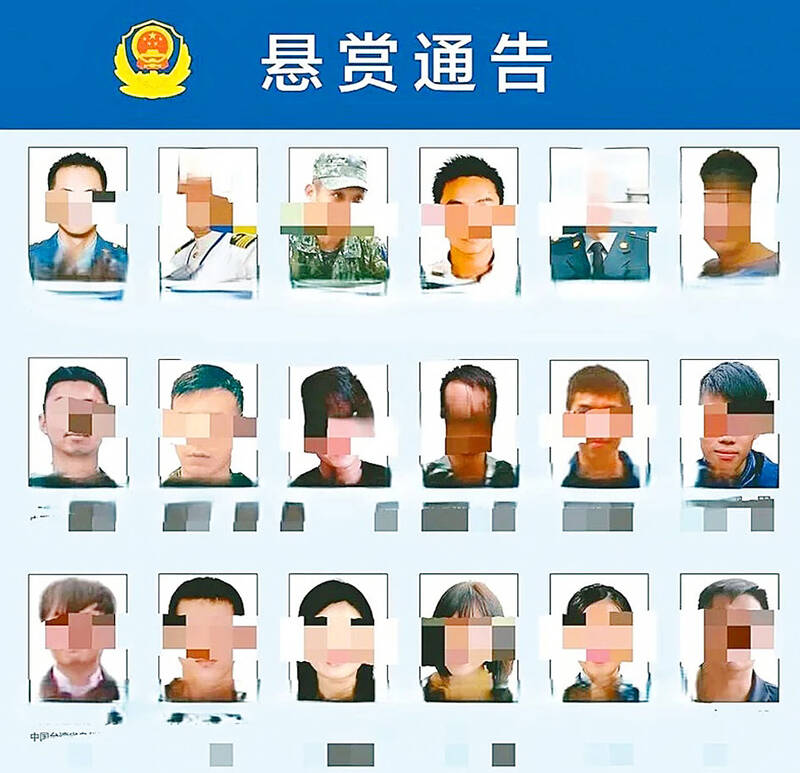China’s “bounty notices” targeting what it called 18 members of Taiwan’s “psychological warfare unit,” along with threats of the death penalty against them, are an attempt to create a chilling effect among Taiwanese, an official said yesterday.
The public security bureau in the Chinese city of Xiamen on Saturday published the names, photographs and ID numbers of 18 alleged “core members” of the military unit.
China Central Television’s online outlet Ri Yue Tan Tian later published an article saying that those deemed “particularly vile” would face severe punishment, including the death penalty, lifelong accountability or trial in absentia.

Photo: Screen grab from the Internet
The unit “did whatever it takes to incite hostility among people in Taiwan toward mainland China” and “attempted to undermine cross-strait peace and obstruct reunification,” the article said.
The so-called bounty notice “fully demonstrated that mainland China has various methods and exceptional skills in cracking down on separatists,” it said, adding that “for the 18 people ... the death penalty, lifelong accountability and trial in absentia will be swords of Damocles hanging over their heads, causing them to live in constant fear.”
A Taiwanese official familiar with Chinese “united front” tactics said the Chinese Communist Party (CCP) targeted the Ministry of National Defense’s psychological warfare unit after previously threatening to punish members of the Information, Communications and Electronic Force Command.
“These bounty notices are intended to intimidate military personnel and create a chilling effect among the public,” the official said, speaking on condition of anonymity.
However, the CCP has no jurisdiction over Taiwan, and members of the unit are highly unlikely to travel to China, the official said.
“Such bounty notices are meaningless,” they said.
The CCP is arbitrarily investigating and publishing the names of whoever it deems necessary, without needing to provide evidence, much like the so-called “22 guidelines to punish Taiwanese independence separatists,” the official said.
This means the CCP can label anyone guilty regardless of facts or evidence, they said.
People traveling to China could face arrest without reasonable cause, and the risk remains high, they added.
“Coercion like this would not work,” they said.
The CCP is targeting Taiwanese military personnel through bounty offers and threats of punishment in an effort to undermine morale, the official said.
However, such attempts are bound to fail, as the accusations made by Beijing are one-sided and do not include supporting evidence, they added.
The CCP also used the bounty notices to spread domestic propaganda, portraying Taiwan as a threat and warning Chinese to be aware of Taiwanese infiltration and attempts to sow division, the official said.
In reality, it is the CCP that has been infiltrating and sowing division in Taiwan, engaging in “united front” warfare, they said, adding that Beijing is brazenly interfering in the Chinese Nationalist Party’s (KMT) chairperson election.
Without any due process, the CCP published personal photographs and information of Taiwan’s military personnel online, the official said.
That was an “extremely crude and sloppy act of investigation,” they said.
Anyone who opposes China’s “one country, two systems” policy toward Taiwan could be investigated and reported according to the “22 guidelines,” and placed on a “wanted” list, the official said.
The CCP is attempting to extend its long-arm jurisdiction to Taiwan, and the bounty notices amount to a form of “lawfare,” albeit a clumsy one, they said.
What is most alarming is that the CCP has already infiltrated Taiwan’s armed forces to a significant degree, a situation that warrants stronger countermeasures, they added.

Three Taiwanese airlines have prohibited passengers from packing Bluetooth earbuds and their charger cases in checked luggage. EVA Air and Uni Air said that Bluetooth earbuds and charger cases are categorized as portable electronic devices, which should be switched off if they are placed in checked luggage based on international aviation safety regulations. They must not be in standby or sleep mode. However, as charging would continue when earbuds are placed in the charger cases, which would contravene international aviation regulations, their cases must be carried as hand luggage, they said. Tigerair Taiwan said that earbud charger cases are equipped

Foreign travelers entering Taiwan on a short layover via Taiwan Taoyuan International Airport are receiving NT$600 gift vouchers from yesterday, the Tourism Administration said, adding that it hopes the incentive would boost tourism consumption at the airport. The program, which allows travelers holding non-Taiwan passports who enter the country during a layover of up to 24 hours to claim a voucher, aims to promote attractions at the airport, the agency said in a statement on Friday. To participate, travelers must sign up on the campaign Web site, the agency said. They can then present their passport and boarding pass for their connecting international

WEATHER Typhoon forming: CWA A tropical depression is expected to form into a typhoon as early as today, the Central Weather Administration (CWA) said yesterday, adding that the storm’s path remains uncertain. Before the weekend, it would move toward the Philippines, the agency said. Some time around Monday next week, it might reach a turning point, either veering north toward waters east of Taiwan or continuing westward across the Philippines, the CWA said. Meanwhile, the eye of Typhoon Kalmaegi was 1,310km south-southeast of Oluanpi (鵝鑾鼻), Taiwan’s southernmost point, as of 2am yesterday, it said. The storm is forecast to move through central

Taiwan sweltered through its hottest October on record, the Central Weather Administration (CWA) said yesterday, the latest in a string of global temperature records. The main island endured its highest average temperature since 1950, CWA forecaster Liu Pei-teng said. Temperatures the world over have soared in recent years as human-induced climate change contributes to ever more erratic weather patterns. Taiwan’s average temperature was 27.381°C as of Thursday, Liu said. Liu said the average could slip 0.1°C by the end of yesterday, but it would still be higher than the previous record of 27.009°C in 2016. "The temperature only started lowering around Oct. 18 or 19